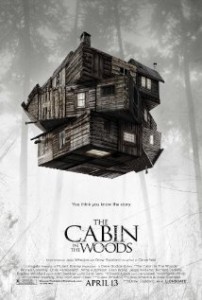Some spoilers below. Please don’t read if you haven’t seen the film and plan on watching it.
 So, I just finished Cabin in the Woods. (Like, two minutes ago “just.”) Reminder: It’s the meta-/pomo-take on the horror film written by Joss Whedon about a quintet of college-age attractive people who go to a cabin in the woods (see what they did there?) and die a series of horrible deaths.
So, I just finished Cabin in the Woods. (Like, two minutes ago “just.”) Reminder: It’s the meta-/pomo-take on the horror film written by Joss Whedon about a quintet of college-age attractive people who go to a cabin in the woods (see what they did there?) and die a series of horrible deaths.
As we find out in the film, the horrible deaths—which they choose and are modeled to look like horror films we are all familiar with—are needed sacrifices to keep the “old ones” at bay, lest they rise up and destroy the world. Crass, pseudo-governmental bureaucrats who wager on the manner of the deaths while boozing it up as the slaughter goes down are in charge of making sure the sacrifices go through properly. Needless to say, they fail this time around and everything goes awry.
I have two quickfire thoughts; more might come later in the week.
Thought the first: Cabin in the Woods doesn’t quite understand the line between “sly commentary” and “smug self-satisfaction.” It thinks it’s making an incredibly clever argument about the ugliness of voyeurism and the bloodlust of the audience. But its reveling in the same negates that message and instead leaves us with a slightly cleverer, slightly broader take on Scream: horror movies have rules; those rules must be followed; if those rules aren’t followed there are consequences. Huzzah! Welcome to 1996.
All of this is a long way of saying that those who argued this film is a “game changer” or one that “turned the genre on its head” or whatever metaphor you like are deluding themselves. It’s a well-executed version of something we’ve been dealing with since, well, the 1990s at least. Probably longer.
Thought the second: I did think the nihilistic finale—in which a pair of millennials decide it is appropriate to let the world be destroyed at the hands of the cruel ancient gods because they’re too feckless to sacrifice themselves and think that an order that would sacrifice five to save billions is just as terrible as an order that would murder billions for pleasure—was pretty great and a sly commentary on the moral relativism of our age. I’m not sure that this is what the authors intended, but the message comes through loud and clear. Especially with the (not quite) closing lines:
The Director: The sun is coming up in eight minutes. If you live to see it, the world will end.
Marty: Maybe that’s the way it should be. If you gotta kill all my friends to survive, maybe it’s time for a change.
And this, ladies and gentlemen, is why we shouldn’t let children make important decisions. Because they can’t see beyond their own noses. Because they have no sense of scale. Because they think that if something isn’t working, you should try and change it, just to try something new.
Sometimes change isn’t all we hope for.
Ya dig?
{ 3 comments… read them below or add one }
I haven’t seen anyone else comment on this, but what about the movie’s conflating Hollywood’s narrative bankruptcy with the END OF THE WORLD. Egotistical, no?
If the finale is as you characterize it, it demonstrates neither nihilism nor, of all things, moral relativism. It demonstrates, merely, a rejection of utilitarianism.
For me, your thought the first was dead on-target and highlighted the fundamental weakness of “Cabin.” I thought it, like both versions of “Funny Games,” wanted very much to have just as much cake on hand after dessert as before. “Cabin” says, “Ain’t dead teenager movies awful and ain’t awful we watch ’em? Here, let me show you how gross they really are and how lacking they are in any real redeeming features by making another one.”
{ 2 trackbacks }